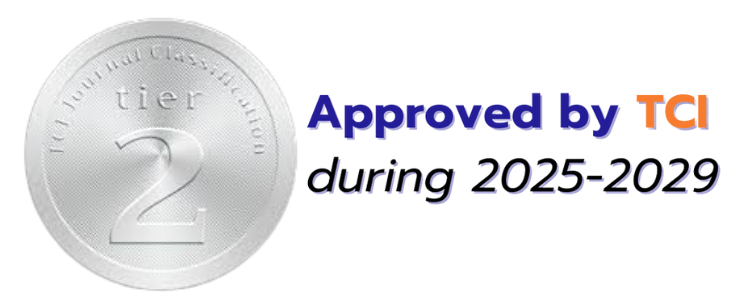ผลลัพธ์การเรียนรู้และสมรรถนะที่จำเป็นของบัณฑิตหลักสูตร วิทยาศาสตรบัณฑิต สาขาเกษตรและสิ่งแวดล้อมศึกษา มหาวิทยาลัยเกษตรศาสตร์ |
Learning Outcomes and Essential Competencies of Graduates from the Bachelor’s Degree of Sciences Program in Agricultural and Environmental Education
Keywords:
ผลลัพธ์การเรียนรู้, สมรรถนะที่จำเป็น, เกษตรและสิ่งแวดล้อมศึกษา, Learning Outcomes, Essential Competencies, Agricultural and Environmental EducationAbstract
การวิจัยเชิงสำรวจนี้มีวัตถุประสงค์เพื่อศึกษาผลลัพธ์การเรียนรู้ของบัณฑิตและความต้องการของผู้ใช้บัณฑิตเกี่ยวกับสมรรถนะที่จำเป็นของบัณฑิตหลักสูตรวิทยาศาสตรบัณฑิต สาขาวิชาเกษตรและสิ่งแวดล้อมศึกษา เก็บข้อมูลระดับผลลัพธ์การเรียนรู้จากกลุ่มตัวอย่างบัณฑิตหลักสูตรวิทยาศาสตรบัณฑิต สาขาวิชาเกษตรและสิ่งแวดล้อมศึกษา ที่เข้าศึกษาระหว่าง พ.ศ. 2559 – 2561 จำนวน 123 คน และเก็บข้อมูลสมรรถนะที่จำเป็นของบัณฑิตหลักสูตรวิทยาศาสตรบัณฑิต สาขาเกษตรและสิ่งแวดล้อมศึกษา จากกลุ่มผู้ใช้บัณฑิต จำนวน 81 คน ด้วยแบบสอบถามที่มีค่าสัมประสิทธิ์แอลฟาของครอนบาคเท่ากับ 0.94 วิเคราะห์ข้อมูลเชิงปริมาณด้วยสถิติพรรณนา ประกอบด้วย ร้อยละ ค่าเฉลี่ย และส่วนเบี่ยงเบนมาตรฐาน การจัดลำดับความต้องการจำเป็นด้วยวิธี Priority Needs Index แบบปรับปรุง
ผลการวิจัยพบว่า ผลลัพธ์การเรียนรู้ของบัณฑิตหลักสูตรวิทยาศาสตรบัณฑิต สาขาวิชาเกษตรและสิ่งแวดล้อมศึกษา เฉลี่ยรวมอยู่ในระดับสูง ( = 4.03, S.D. = 0.69) โดยทักษะความสัมพันธ์ระหว่างบุคคลและความรับผิดชอบ มีระดับสูงที่สุด รองลงมาคือ ด้านคุณธรรมและจริยธรรม และด้านทักษะทางปัญญาอยู่ในระดับสูง สำหรับสมรรถนะที่จำเป็นของบัณฑิตตามความต้องการของผู้ใช้บัณฑิต พบว่า สมรรถนะของบัณฑิตหลักสูตรวิทยาศาสตรบัณฑิต สาขาวิชาเกษตรและสิ่งแวดล้อมศึกษา ตามสภาพที่เป็นจริงและสภาพที่ผู้ใช้บัณฑิตต้องการ ในภาพรวมมีค่าอยู่ในระดับสูง ส่วนค่า PNImodified มีพิสัยของดัชนีความต้องการจำเป็นอยู่ระหว่าง 0.16 – 0.25 โดยสมรรถนะด้านความรู้ที่เอื้อต่อการปฏิบัติเป็นความต้องการจำเป็นอันดับแรก รองลงมาคือ การสื่อสารที่มีประสิทธิภาพ การวางแผนการบริหารจัดการ และการแก้ปัญหา ตามลำดับ
The purpose of this survey research was to study learning outcomes and the needs of employers regarding essential competencies of graduates from the Bachelor’s Degree of Sciences Program in Agricultural and Environmental Education. Survey questionnaires with Cronbach’s Correlation Coefficient of 0.94 were used to collect data on learning outcomes from 117 samples of graduates from the Bachelor’s Degree of Sciences Program in Agricultural and Environmental Education, and data on graduates’ essential competencies from 81 samples of employers. Quantitative data were analyzed using descriptive statistics including percentage, mean, and standard deviation. Needs were prioritized by way of Refined Priority Needs Index.
It was found from the research that the overall learning outcomes of graduates from the Bachelor’s Degree of Sciences Program in Agricultural and Environmental Education were at a high-level average ( = 4.03, S.D. = 0.69). When being analyzed by aspects, interpersonal skills and responsibility were found as being at the highest level, followed by morals and ethics, and intellectual skills at a high level respectively. With respect to essential competencies in response to employers’ needs, the values of both graduates’ actual and needed competencies were at a high level. In terms of PNImodified, the range of needs index was between 0.16 – 0.25, whereas the first priority was practical knowledge, followed by efficient communication, administrative and managerial planning, and problem-solving respectively.
Downloads
References
Chaowarakul, J. (2020). Characteristics of Graduates According to the needs of 21st Century Enterprises. HUSO Journal of Humanities and Social Sciences, 4(2), 100 - 111.
Chavanavesskul, S. (2010). The Study in Institutions for Satisfactory Assessment of Employers and Students' Needs: A Case Study of Department of Geography, Faculty of Social Sciences, Srinakharinwirot University. Journal of Social Sciences Srinakharinwirot University, 13, 86 - 99.
Department of Human and Community Resource Development. (2006). Potential and direction of graduate students in Agricultural and Environmental Education. Retrieved from Kasetsart University.
Karndacharuk, S., Kawinsuporn, P., Aunsiri, S., & Somgasorn, S. (2022). A Study of Learner Outcomes Based on Higher Education Standard B.E. 2561 from the Learning of Christian University of Thailand Undergraduate Students According to Thai Qualifications Framework for Higher Education. Journal of education silpakorn university, 20(2), 367 - 381.
McClelland, D. C. (1973). Testing for competence rather than for intelligence. American Psychologist, 28(1), 1 - 14.
Ministry of Higher Education Science Research and Innovation. (2022). National Plan for Human Resources Production and Development of Higher Education from 2021 to 2037. Bangkok: office of the permanent secretary, Ministry of Higher Education, Science, Research and Innovation.
office of the permanent secretary Ministry of Higher Education Science Research and Innovation. (2022). Policies and Strategies for Higher Education, Science, Research and Innovation 2020 - 2027 Retrieved from https://backend.tsri.or.th/files/trf/2/docs/Policy_and_Strategy_of_Thailand_HESI_2563-2570_and_Thailand_SRI_Plan_2563-2565.pdf
Panich, V. (2012). Student Learning Methods in the 21st Century. Bangkok: Sodsri-Saritwong Foundation.
Partnership for 21st Century Skills. (2007). Beyond the three Rs: Voter attitudes toward 21st century skills. Retrieved from https://www.21stcenturyskills.org/documents/P21_pollreport_singlepg.pdf
Pienthong, A., & Samranpol, D. (2014). Actual characteristics according to the National Qualifications Framework for Higher Education in the International Sword Course of the Institute of Physical Education Chonburi Campus students. Rajamangala University of Technology Social Science Journal, 3(2), 30 -35.
Pinta, L., & Utama_Ang, S. (2015). Quality Perception of graduates, Attitude of entrepreneur for the quality and the competencies that is necessary for the Data Management graduate students of the university where the graduate practitioners emphasize. Journal of Humanities and Social Sciences 11(2), 91 - 116.
Poonputta, A. (2020). Characteristics to Thai Qualifications Framework for Higher Education (TQF) of Undergraduate Students Learning in General Education Mahasarakham University. Journal of Research and Development, 15(2), 101 - 112.
Prasertsin, U., Srihaset, K., & Laonoi, A. (2021). Guidelines for Competency-Based Assessment in 21st Century. Journal of Educational Measurement, Mahasarakham University, 27(2), 16 - 30.
Saengloetuthai, J., Thongnin, P., Booncherdchoo, N., Maneerat, C., Srisopha, Y., & Takomsane, M. (2020). Action Learning. Academic Journal of Phetchaburi Rajabhat University, 10(3), 155 - 163.
Songsraboon, R. (2020). Essential Competencies Required of Graduates from the Faculty of Business Administration Department of Finance and Banking. Journal of Political Science Suan Sunandha Rajabhat University, 3(1), 30 - 39.
Thanormchayathawat, B. V., Pongsri, & Niemted, W. (2016). 21st Century Skills: A Challenge for Student Development. The Southern College Network Journal of Nursing and Public Health, 3 (2).
Wirotsattabut, C., Suphannachart, W., & Praneetvatakul, S. (2017). Impacts of Aging Society on Labor Productivity in the Agricultural Sector of Thailand. Paper presented at the The 14th Kasetsart University Kamphaeng Saen Campus national Conference, Nakhon Pathom.
Wongwanich, S. (2007). Necessary Needs Assessment Research. Bangkok: Chulalongkorn University Press.
Yamane, T. (1973). Statistics: An introductory statistics. New York: Harper & Row.







